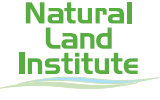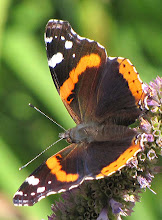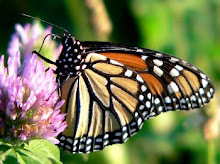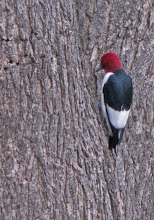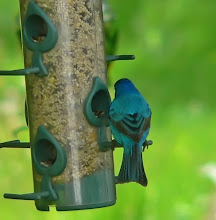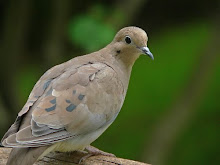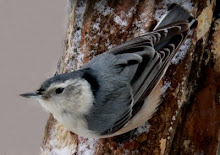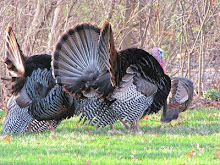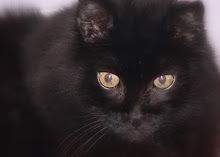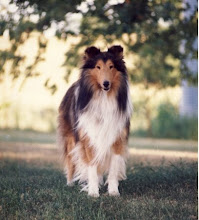
This is Diddle, so named because of his scientific genus Didelphis virgiana. Diddle sometimes shows up in the evenings to vacuum the areas under the bird feeders. He cleans up the seeds and hulls the birds miss.
As a young child, I never remember seeing an opossum around our home which is odd since we lived in a very rural area. Probably our collie, who always had the run of the place, kept them away. My first encounter was at grade school. Somehow one had gotten into the coat room of the old country schoolhouse and our teacher promptly called the sheriff. The deputy walked up to it, grabbed it by the tail and handed it off to his partner in the patrol car. Holding the opossum by the tail out the open window, they told us they were going to drive it down to the woods and let it go. We all stood at the windows watching the little creature hang limply out the window as the sheriff's car drove slowly away. Some of us waived goodbye to it as children will do:)

Some very interesting things I learned about opossums:
They are usually nocturnal and seldom seen in warmer months but will come out to forage for food during the daylight in winter months.
From a health viewpoint, opossum's immune systems are better than most animals and they groom themselves like finicky house cats. They are unlikely to spread disease, in fact much more unlikely than dogs or cats. Opossums have a great natural resistance to rabies.
They are not territorial and tend to wander. They shift den sites frequently throughout their short lifespan (1-4 years).
Learning and discrimination tests rank opossums above dogs and and put them at about the level of pigs.
They will eat almost anything including rats and mice and they consider slugs and snails a delicacy. They are immune to viper venom and will sometimes eat snakes.
They don't attack and seldom bite. When confronted by an enemy they sometimes hiss and show 50 fearsomely pointed teeth. If that doesn't discourage the attacker, they go into a shock like state which often makes the attacker believe the animal is sick or dead.
Opossums have opposable 'thumbs' on their hind feet.
They are the only marsupial found in the US or Canada.
According to some sources, the name opossum comes from "apasum" an Algonquin Indian word meaning "white animal".

They are usually nocturnal and seldom seen in warmer months but will come out to forage for food during the daylight in winter months.
From a health viewpoint, opossum's immune systems are better than most animals and they groom themselves like finicky house cats. They are unlikely to spread disease, in fact much more unlikely than dogs or cats. Opossums have a great natural resistance to rabies.
They are not territorial and tend to wander. They shift den sites frequently throughout their short lifespan (1-4 years).
Learning and discrimination tests rank opossums above dogs and and put them at about the level of pigs.
They will eat almost anything including rats and mice and they consider slugs and snails a delicacy. They are immune to viper venom and will sometimes eat snakes.
They don't attack and seldom bite. When confronted by an enemy they sometimes hiss and show 50 fearsomely pointed teeth. If that doesn't discourage the attacker, they go into a shock like state which often makes the attacker believe the animal is sick or dead.
Opossums have opposable 'thumbs' on their hind feet.
They are the only marsupial found in the US or Canada.
In a letter, Captain John Smith gave us the first English language description of the opossum in 1608. "An Opassom hath an head like a Swine, and a taile like a Rat, and is of the bignes of a Cat. Under her belly she hath a bagge, wherein shee lodgeth, carrieth, and sucketh her young."
According to some sources, the name opossum comes from "apasum" an Algonquin Indian word meaning "white animal".

Backing out the driveway
the car lights cast an eerie glow
in the morning fog centering
on movement in the rain slick street
Hitting brakes I anticipate a squirrel or a cat or sometimes a little raccoon
I once braked for a blind little mole who try though he did
could not escape the cat toying with his life
Mother-to-be possum occasionally lopes home . . . being
naturally . . . slow her condition makes her even more ginger
We need a sign POSSUM CROSSING to warn coffee-gurgling neighbors:
we share the streets with more than trucks and vans and
railroad crossings
All birds being the living kin of dinosaurs
think themselves invincible and pay no heed
to the rolling wheels while they dine
on an unlucky rabbit
the car lights cast an eerie glow
in the morning fog centering
on movement in the rain slick street
Hitting brakes I anticipate a squirrel or a cat or sometimes a little raccoon
I once braked for a blind little mole who try though he did
could not escape the cat toying with his life
Mother-to-be possum occasionally lopes home . . . being
naturally . . . slow her condition makes her even more ginger
We need a sign POSSUM CROSSING to warn coffee-gurgling neighbors:
we share the streets with more than trucks and vans and
railroad crossings
All birds being the living kin of dinosaurs
think themselves invincible and pay no heed
to the rolling wheels while they dine
on an unlucky rabbit
I hit brakes for the flutter of the lights hoping it's not a deer
or a skunk or a groundhog
coffee splashes over the cup which I quickly put away from me
and into the empty passenger seat
I look . . .relieved and exasperated ...
to discover I have just missed a big wet leaf
struggling . . . to lift itself into the wind
and live
or a skunk or a groundhog
coffee splashes over the cup which I quickly put away from me
and into the empty passenger seat
I look . . .relieved and exasperated ...
to discover I have just missed a big wet leaf
struggling . . . to lift itself into the wind
and live


